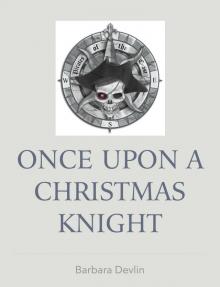- Home
- Barbara Devlin
Arucard (Brethren Origins Book 1)
Arucard (Brethren Origins Book 1) Read online
ARUCARD
Barbara Devlin
OTHER TITLES BY BARBARA DEVLIN
BRETHREN OF THE COAST SERIES
Enter the Brethren (Brethren of the Coast 1)
My Lady, the Spy (Brethren of the Coast 2)
The Most Unlikely Lady (Brethren of the Coast 3)
One-Knight Stand (Brethren of the Coast 4)
Captain of Her Heart (Brethren of the Coast 5)
The Lucky One (Brethren of the Coast 6)
Loving Lieutenant Douglas: A Brethren of the Coast Novella
BRETHREN ORIGINS SERIES
Arucard (Brethren Origins 1)
COPYRIGHT
This is a work of fiction. Names, characters, organizations, places, events, and incidents are either products of the author’s imagination or are used fictitiously.
Copyright © 2015 Barbara C. Noyes
All Rights Reserved
No part of this book may be reproduced, or stored in a retrieval system, or transmitted in any form or by any means, electronic, mechanical, photocopying, recording, or otherwise, without the express written permission of the publisher. This book may be loaned only through the Amazon lending library program.
Published by Barbara Devlin
The Brethren of the Coast Badge is a registered trademark ® of Barbara Devlin.
ISBN-978-0-9962509-1-7
Cover art by Lewellen Designs, www.lyndseylewellen.wordpress.com
DEDICATION
To the late Tonya M. Rupell of Stone Soup Designs. I met Tonya through the indie author community, and the minute I saw her fabulous work, I knew I had to commission custom swag from her. Tonya was a loving and generous person who took pride in her artistry, and she collaborated with me on some wonderful pieces, which I gave as prizes to my readers. My dear friend passed away during the composition of this novel, and she was taken far too soon.
Godspeed, Tonya. We will meet again.
TABLE OF CONTENTS
ARUCARD
OTHER TITLES BY BARBARA DEVLIN
COPYRIGHT
DEDICATION
PROLOGUE
CHAPTER ONE
CHAPTER TWO
CHAPTER THREE
CHAPTER FOUR
CHAPTER FIVE
CHAPTER SIX
CHAPTER SEVEN
CHAPTER EIGHT
CHAPTER NINE
CHAPTER TEN
CHAPTER ELEVEN
CHAPTER TWELVE
CHAPTER THIRTEEN
CHAPTER FOURTEEN
CHAPTER FIFTEEN
CHAPTER SIXTEEN
CHAPTER SEVENTEEN
CHAPTER EIGHTEEN
EPILOGUE
Excerpt from Love With An Improper Stranger
PROLOGUE
La Rochelle, France
Friday the Thirteenth, October
The Year of Our Lord, 1307
Hunkered behind a stack of barrels, Templar Knight Arucard de Villiers hugged his sword and prepared to lunge, as King Philip’s guards searched the undercroft. When the pile of casks shifted, he crouched lower and uttered a silent entreaty, as he gazed at his tormentors through a crevice in the mountain of containers. At the age of seven and twenty, he had fought hard for his patron Pope Clement V, and never in his life had he cowered from peril. But desperate circumstances necessitated drastic measures, if he hoped to survive the Crown’s connivance against the warriors of the Crusades.
WANTED: DEAD OR ALIVE
In the dim light of the braziers, he peered at the warrant, which commanded Arucard, along with his brother knights, to surrender for interrogation, regarding unfounded accusations of heresy, sorcery, and unspeakable acts of sexual perversion, the whole of which were false. But he knew too well the true motives upon which the malicious conspiracy had been launched, and it had naught to do with the heinous claims. Rather, King Philip needed money, and he craved ownership of the vast Templar treasure.
“It is as I told thee, good sir.” Arucard’s marshalsea on land and second in command on sea, Pellier bowed. “My lord departed on Thursday last, and he never returned.”
“Merde.” The soldier gritted his teeth. “Then I suggest thou vacate the premises, at once, as His Majesty hereby confiscates these properties, forthwith.”
“Of course.” Again, Pellier made his obedience. “If we might have enough time to gather our personal effects, given a handful of servants remain in residence, we shall leave the keep to thy good service.”
“Thou mayest have until the morrow.” The guard dipped his chin, gave the vaulted cellar a final cursory glance, and then directed his men. “Let us ride for Moncel Abbey.”
From the safe haven of his hiding place, Arucard smiled, because Morgan, the lord of Moncel, along with Geoffrey and Aristide, had retreated to his ship at dawn and already should have cast off for the prearranged meeting point, northwest of the Golfe de Gascogne. Soon, Arucard would withdraw to join his hunted brothers, as they sailed the Channel and sought asylum in England, whither Edward II had outlawed torture.
The estimable empire may reject the once esteemed Order of great men, but it could offer sanctuary. And if his brothers could find a new supporter, their legacy, along with their necks, would persist. It was with that thought in mind that he sheltered, despite a deep-seated desire to fight—to defend the honor of his brethren, present and past.
“My lord, they art gone.” Grunting and groaning, Pellier removed three empty barrels, so Arucard could emerge from the haphazard refuge. “And we should make haste to the docks, given the royal patrol executes Philip’s decree, as thou were warned. Wherefore didst thou not flee when thee first learned of the scheme?”
“Because we needed to give our brothers a chance to elude the Crown. Didst thou deposit the gold for our citizens who have chosen to stay in France?” In the kitchen, Arucard assessed the remaining stores. “If they art careful, they can subsist for years, to come, on the profits from their trade, as I will no longer be able to protect them.”
“Indeed, sir.” With a sigh, Pellier frowned. “My father vows to oversee the funds, in order to preserve the village, in thy absence.”
“Art thou sure thou dost wish to journey with me, my friend?” How Arucard loathed separating his men from their families, which is wherefore he asked only the unmarried seamen to join him, as they risked everything to avoid persecution by association. “As thou could always grow a beard and take up farming or the smithy.”
“Beg thy pardon, my lord.” Pellier opened his mouth, closed it, and then grinned. “Thou dost joke, sir.”
“I do.” However inappropriate, given the gravity of the circumstances, he could use a little levity, at the moment. “Now let us away, as we have no time to spare.”
The back hall led to the scullery, which egressed to the yard and the gardens, whither Arucard often engaged in weapons practice. In the cool evening air, as dew kissed the lawn, he strode the path and climbed the rise, which opened to the grove, whither his destrier, Pellier’s rouncey, and the sumpter horse loaded with Arucard’s few intimate belongings had been tied to the trees.
Gaining his mount, he steered for the muddy road, which had deteriorated after the previous day’s heavy rains, to the port. On normal occasions, normal being the dearth of troops out for his head, Arucard would have carried a torch to illuminate the route, as the sun set on the horizon, but he could ill afford such luxury, so he maintained a slow but steady pace. When they reached the hilltop, he reined in to take one last look at his home, which he suspected he would never enjoy again.
“Lights in the meadow, sir.” As his horse shifted, Pellier pointed to the east and cursed. “Mon Dieu. It is the patrol.”
�
�By the saints. They must have doubted thy account, else fortune frowns on our endeavor.” In a flash, Arucard heeled hard the flanks of his stallion. “We must hurry, if we art to escape.”
To avoid wagon ruts, he kept to the grassy verge, with Pellier in his wake. His heart pounded, beating in rhythm as he pushed his destrier harder and faster. They veered left, then right, and then left again, snaking amid the sludge with the King’s guard in their tracks. At last, the dense foliage yielded to sparse outbuildings, heralding they neared the quaint seaside town, whither the lanes improved, and Arucard picked up speed.
Racing through the marketplace, which was closed for the day and thus sparsely populated, he glanced over his shoulder and discovered the King’s guard had gained valuable ground, and he swore under his breath. “Ride for the ship, Pellier. Do not stop until thou hast boarded the Olifant. And tell the men to throw off the ropes and weigh anchor, as we must sail, immediately.”
“Aye, sir.” At the docks, Pellier abided Arucard’s orders, signaling with a mock salute.
“To arms! To arms!” In turn, Arucard pounded the boards, to sound the alarm and alert his brothers. “Onward, Demetrius. Randulf, abandon the wine, as thou must go—now. Philip’s patrol nears.”
At his proclamation, sailors scrambled in all directions, toppling bags of flour and rice, as they ran for their respective transports. The original plan had been to trail the merchant vessels, which ventured on the morrow tide, to avoid rousing even a mere soupçon of consternation, but they could not wait for dawn, so he altered his tack.
Charging the gangplank, he brought his stallion to a halt and slid from the saddle, as his single-masted cog slipped from its berth. When the wind caught the canvas, he took the helm and set a course for the open seas. But he could not rejoice, as Demetrius remained dangerously close to the docks, within striking distance, and young Randulf, reluctant to relinquish the cask, had just pulled his lines, when the archers took aim.
Then, to his unutterable horror, soldiers rolled in three carro-ballistas and launched a hailstorm, in rapid succession, of flaming bolts into the air. Cries of terror formed a morbid cacophony, echoing on the gentle breeze. Helpless to aid his brothers, Arucard clenched his fists and gnashed his teeth, as first Demetrius and then Randulf’s ship caught fire.
“What can we do, sir?” With a grimace, Pellier rubbed his neck. “How can we save them?”
“It appears Demetrius has extinguished the small blaze that threatened the Tigus, but I fear thither is naught we can do to assist the Spearintine, as the hold is engulfed, and the gadling founders.” Even as he voiced the obvious, he prayed he was wrong. With his thumb and forefinger, Arucard stared into the twilight and touched his forehead, chest, and left and then right shoulder, as the King had just claimed a victim—the first of many, no doubt. “May the Almighty Father have mercy on Randulf’s soul.”
In what seemed as several painful hours, but was in reality a few minutes, the knarr sank beneath the water’s surface, disappearing bit by bit until not even the masthead remained visible. On the outside, he maintained his composure, as his crew relied on him for guidance, but inside he wept for his friend, a regrettable cost—a human sacrifice exacted by Philip’s cursed lust for wealth and power.
As the Olifant rode the waves, gliding in a graceful dance as the craft passed the golfe’s foreland, a familiar sight that had always soothed his often frazzled nerves, he fixed his attention on the bow, on the road that lay ahead, and vowed never again to surrender one of his brothers in the name of greed. And so it was with that train of thought he gave his attention to the charts.
“Sir, dost thou ever believe we will go home, again?” Leaning against the rail, Pellier stared a-stern. “Or dost thou think Edward will kill us, on sight?”
“We have no home, Pellier.” Listing with the motion of the ocean, Arucard swallowed hard, as a crude reality set in with a vengeance just then. Yet all was not lost, and he coveted hope to be won in a foreign land. “But if we art to endure, mighty England is our future, and if she will have us, we shall serve her with honor until we breathe our last.”
CHAPTER ONE
England
The Year of Our Lord, 1312
Locked in the tiny stone cell in the tower keep for an untold period, which he estimated at well nigh five years as marked by the canonical hours, Arucard gazed at the azure morning sky, gave thanks for another day above ground, and wondered how his brothers fared in captivity. Were they alive and well, or had Edward executed them for the blasphemous but fallacious allegations that threatened the once great Order of Knights Templar?
The rasp of the metal lock and the screech of the hinges had him bracing for the final sentence, as he broke his fast at dawn with a customary light sop, and the bells had yet to signal sext, so he had not anticipated the noon meal. Had the Crown’s men, at last, come for him? “Thither who goes?”
“It is Brewer, Sir Arucard.” The steward, who had been very kind throughout Arucard’s imprisonment, entered along with a small army of servants bearing a large ancere, a stack of linen cloths, and buckets of water, in the company of a familiar, much-welcomed face. “Thou art to prepare for an audience with His Majesty. I bring thee a square of barilla soap, a sharp blade for shaving, and a change of clothes, which the King requests thee wear for the singular occasion.”
“Am I to be tried for Philip’s spurious claims?” On edge, he charged the poor soul but drew up short, as Brewer was not to blame for Arucard’s predicament. “Am I to dress for my death?”
“His Royal Highness does not see fit to apprise me of his intentions, Sir Arucard. As I am but a fleak, I do His bidding, naught more.” Brewer directed the attendants and then loomed in the entry. “Thou hast an hour to tend thy needs, and then the royal escort will convey thee to St. John’s Chapel. That is all I know, sir.”
Once Brewer departed, Arucard and Pellier locked forearms in companionship. “My friend, it is good to see thee.”
“And thou, sir.” Misty-eyed, and a bit worse for wear, Pellier smiled. “The crew has been tormented by thoughts of thy demise, as we have had no word of thee.”
“Thou art housed together?” Releasing his comrade, he stumbled back and gave thanks in silence. “The men prevail?”
“Aye.” Drawing a shaky breath, Pellier dipped his chin. “By the benevolence of God, we art all well and accounted for, sir. Even when young Thomas caught the ague, the King sent a physician to treat the boy. And I am summoned to assist thee in grooming for an important event.”
The revelations did much to soothe Arucard’s nerves, as it made no sense for Edward to maintain the crew’s health and Arucard’s appearance, if the Crown intended to kill them, in the end. Glancing at the steaming tub, he doffed his linen underclothes and woolen stockings.
As he sank into the water, he savored the experience, as baths were a rarity in confinement. For a Templar Knight, cleanliness was a priority, second only to his daily devotional, and the denial of what most deemed a simple pleasure had actually served only to intensify the wretched conditions of his cell. After a thorough scrubbing of his body and washing his hair, he emerged as a new man, stepped into clean braies, and sat with the patience of a saint, as Pellier shaved the long beard and cut the tangled locks.
“Thither, sir.” With hands on hips, Pellier admired his work. “Thou dost look as thee did the night we departed France, if a tad older.”
“So thy humor remains in fine form.” With a chuckle and a much-improved spirit, Arucard donned the chausses, the linen shirt, the calf-boots, the navy wool cotehardie, over which he pulled on the matching doublet bedecked in gold braids. The fur-lined cloak of equal splendor left him perplexed, as did the ailette, fashioned of leather and bearing a unique wind-star design foreign to him, which was typically laced to the shoulder, over armor, and bore the bearer’s coat of arms. “Well, what dost thou think? Am I fit to receive the King?”
“I cannot say, sir.” Pellier shrugged and th
en flinched, as the steward returned. Retreating to the small table, whither Arucard partook his meals, the marshalsea frowned. “But I pray fortune smiles upon thee, and we meet tomorrow to celebrate glad tidings.”
“If thou wilt follow me, Sir Arucard.” Brewer inched aside. “His Majesty awaits thy presence.”
Without a word, Arucard strolled into the dark corridor, and an escort armed with shields and pointed halberds surrounded him. Stiffening his spine, he promised to withstand, with grace and honor, whatever Edward had in store, as he would not embarrass his ancestors. The stone passage, aglow in the soft amber light from cresset lamps spaced in equal distances on the wall, led to a narrow winding staircase, which he ascended. At the landing, the guards turned left, and a vast expanse spread before him.
Huge glazed windows filtered the sun’s bright rays, and vibrant tapestries decorated the great hall. Servants and elegantly garbed nobles scurried in various directions, sparing nary a glance at him. At a double-door entrance, a sentry set wide the heavy panels, revealing a vaulted chapel—not a block for beheading.
Four massive columns connected by plain arches, and decorated with naught more than pedestrian carvings of scallop and leaf designs, flanked either side of the wide aisle, and an identical combination of similarly ornamented thick round piers, on a smaller scale, formed the apse. But it was the group of men identically uniformed and gathered before the altar that gave him pause.
“Brothers.” With splayed arms, he greeted his fellow Templar Knights, and they exchanged fraternal salutations and hearty backslaps. “Demetrius, Aristide, Morgan, and Geoffrey, dost my eyes deceive me? Am I dreaming?”
“Hither we art, but I am concerned for thy mental state, if thou dost resort to fantasies of me to pass the time.” Ever the wit, Demetrius elbowed Arucard in the ribs. “As it stands, I summoned visions of tables overflowing with roasted pork and smoked herring. And what I would give for a tankard of beer, as we have been restricted to wine and Adam’s ale, which I wilt argue is cruel and unusual punishment.”

 Pirates of Britannia Boxed Set Volume One: A Collection of Pirate Romance Tales
Pirates of Britannia Boxed Set Volume One: A Collection of Pirate Romance Tales A Very Brethren Christmas (Brethren of the Coast Book 10)
A Very Brethren Christmas (Brethren of the Coast Book 10) Brethren of the Coast Box Set 2
Brethren of the Coast Box Set 2 Hold Me, Thrill Me, Kiss Me: A Brethren of the Coast Novella
Hold Me, Thrill Me, Kiss Me: A Brethren of the Coast Novella The Reaper (Pirates of the Coast Book 8)
The Reaper (Pirates of the Coast Book 8) The Stablemaster's Daughter (Regency Rendezvous Book 11)
The Stablemaster's Daughter (Regency Rendezvous Book 11) World of De Wolfe Pack_The Big Bad De Wolfe
World of De Wolfe Pack_The Big Bad De Wolfe The Duke Wears Nada
The Duke Wears Nada The Iron Corsair (Pirates of the Coast Book 2)
The Iron Corsair (Pirates of the Coast Book 2) The Buccaneer
The Buccaneer Hold Me, Thrill Me, Kiss Me
Hold Me, Thrill Me, Kiss Me The Reaper
The Reaper The Blood Reaver
The Blood Reaver Morgan (Brethren Origins Book 4)
Morgan (Brethren Origins Book 4) Love With an Improper Stranger
Love With an Improper Stranger The Blood Reaver (Pirates of Britannia Book 6)
The Blood Reaver (Pirates of Britannia Book 6) Tall, Dark & De Wolfe
Tall, Dark & De Wolfe World of de Wolfe Pack: Lone Wolfe (Kindle Worlds Novella) (Heirs of Titus De Wolfe Book 1)
World of de Wolfe Pack: Lone Wolfe (Kindle Worlds Novella) (Heirs of Titus De Wolfe Book 1) The Black Morass (Pirates of the Coast Book 1)
The Black Morass (Pirates of the Coast Book 1) A Jewel In Time; A Sultry Sisters Anthology
A Jewel In Time; A Sultry Sisters Anthology The Marooner
The Marooner The Iron Corsair
The Iron Corsair The Most Unlikely Lady
The Most Unlikely Lady One-Knight Stand
One-Knight Stand Arucard (Brethren Origins Book 1)
Arucard (Brethren Origins Book 1) Once Upon a Christmas Knight
Once Upon a Christmas Knight Demetrius (Brethren Origins Book 2)
Demetrius (Brethren Origins Book 2) The Buccaneer (Pirates of the Coast)
The Buccaneer (Pirates of the Coast) The Marooner (Pirates of the Coast Book 3)
The Marooner (Pirates of the Coast Book 3) World of De Wolfe Pack: The Big Bad De Wolfe (Kindle Worlds Novella) (Heirs of Titus De Wolfe Book 2)
World of De Wolfe Pack: The Big Bad De Wolfe (Kindle Worlds Novella) (Heirs of Titus De Wolfe Book 2) Tall, Dark, and Medieval
Tall, Dark, and Medieval My Lady, The Spy
My Lady, The Spy The Lucky One (Brethren Of The Coast #6)
The Lucky One (Brethren Of The Coast #6) Captain Of Her Heart
Captain Of Her Heart World of De Wolfe Pack_Tall, Dark & De Wolfe
World of De Wolfe Pack_Tall, Dark & De Wolfe World of De Wolfe Pack: Tall, Dark & De Wolfe (Kindle Worlds Novella) (Heirs of Titus De Wolfe Book 3)
World of De Wolfe Pack: Tall, Dark & De Wolfe (Kindle Worlds Novella) (Heirs of Titus De Wolfe Book 3) To Catch A Fallen Spy (Brethren of the Coast Book 8)
To Catch A Fallen Spy (Brethren of the Coast Book 8) Lone Wolfe
Lone Wolfe